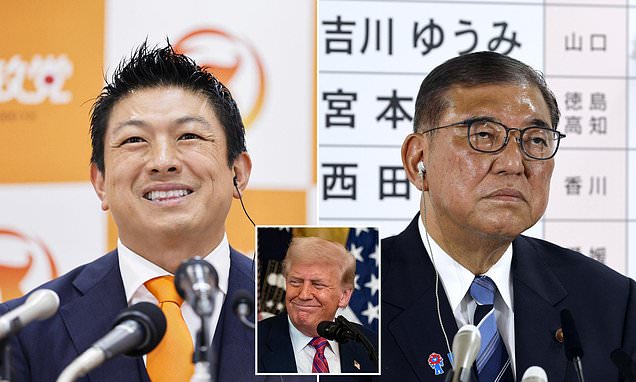In a political earthquake shaking Japan’s postwar consensus, the far-right Sanseitō party—once a fringe internet movement—has surged in the latest upper house elections, riding a wave of nationalism, anti-globalism, and frustration with the status quo. Their slogan: “Japanese First,” a clear nod to U.S. President Donald Trump’s populist “America First” campaign.
Sanseitō, meaning “Party of Do It Yourself,” was founded in 2020 and rose to prominence through YouTube, capitalizing on anti-establishment messaging. Its leader, Sohei Kamiya, has openly praised Trump and modeled much of his political strategy on the former U.S. president’s combative, media-savvy style.
In Sunday’s elections, Sanseitō stunned the establishment by winning up to 22 seats in Japan’s 248-seat upper chamber—a staggering leap from just one seat previously. The results reflect a dramatic shift in public sentiment, particularly among younger voters disillusioned by economic stagnation and the political elite.
‘Japanese First’ movement surges
Among Japan’s ultra-conservatives, online activists, and parties like Sanseitō, Trump is a widely admired figure.
He’s seen as a symbol of resistance against globalism, multiculturalism, the WHO, and perceived Western liberalism. His stance against China also resonated with nationalist factions in Japan.
Trump also had close relations with the late Shinzo Abe, who is widely regarded as one of the most influential and powerful political leaders hailing from Japan.
Shinzo Abe was Japan’s longest-serving prime minister and was known for his conservative and nationalist politics. His policies and ideology are often described under the label of “Abenomics” for the economy and “Abe Doctrine” for foreign and security policy.
His close relationship with Trump, due to many coinciding political and ideological convergences, is recognized in Japan.
The Sanseitō party works on many similar nationalist ideas that coincide with those of Trump, including:
Strict immigration controls, warning of a “silent invasion” by foreigners. Bans on foreign property ownership and tighter rules for foreign residents
Tax cuts for Japanese citizens and reduced welfare for non-citizens, with rejection of LGBTQ rights and emphasis on traditional family values.
Sanseitō also took aim at global institutions, portraying the World Economic Forum and foreign influence as threats to Japan’s sovereignty.
The ruling Liberal Democratic Party (LDP), led by Prime Minister Shigeru Ishiba, entered the elections battered by record inflation, a plunging yen (¥149 to the U.S. dollar), and new tariffs from Washington. Corruption scandals and economic malaise have driven Ishiba’s approval ratings below 25%, setting the stage for Sanseitō’s rise.
Voter turnout surged among men under 35, many drawn to the party’s outsider appeal and direct online messaging. Sanseitō’s YouTube channel boasts over 400,000 subscribers—far eclipsing those of traditional political parties.
The Trump Effect, Japanese-Style
While Kamiya distances himself from overt racism or neo-fascism, critics warn that Sanseitō flirts with dangerous ideologies. The party has made efforts to soften its image during the campaign, but its rhetoric around immigrants and “national purity” has raised some alarms.
Political analysts suggest Sanseitō is not just a flash-in-the-pan protest vote, but part of a broader global trend toward identity-based politics. As in the U.S., many Japanese voters feel left behind by globalization and rapid social change.
The LDP is expected to lose its upper house majority, dealing a serious blow to Ishiba’s already precarious leadership. In response, mainstream politicians are beginning to echo some of Sanseitō’s hardline positions, suggesting the party’s influence could extend far beyond its base.
Sohei Kamiya has expressed ambitions to grow Sanseitō’s presence further, hinting at coalitions with other nationalist factions and targeting 50–60 seats in the next general election.
Japan, long viewed as a bastion of political moderation and stability, now finds itself at a crossroads. With birth rates plummeting, foreign labor increasingly essential, and economic anxiety at historic highs, the appeal of “Japanese First” populism is likely to endure.
The question is whether this moment marks a lasting realignment in Japanese politics—or a volatile phase hinting at far greater upheaval.








